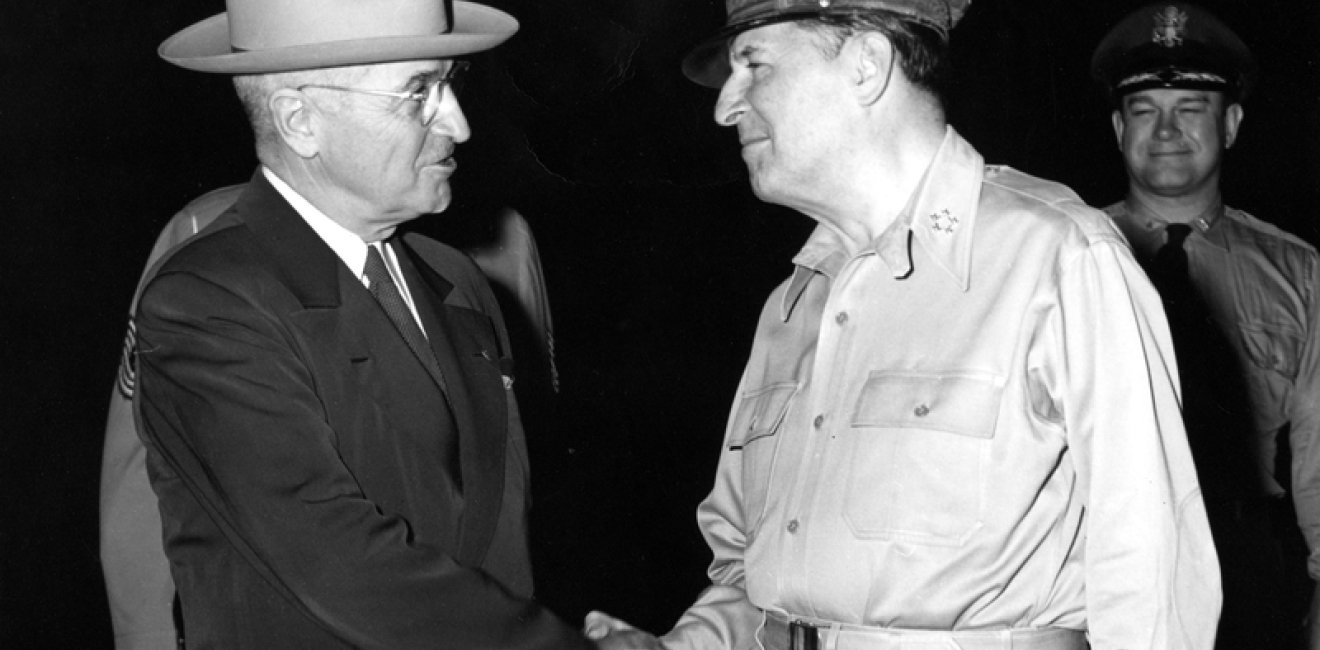Expanding Records of an Unended War
Thanks to recent declassifications and accretions to the Truman library’s collections, the documentary record of the Korean War continues to grow.

A blog of the History and Public Policy Program
Thanks to recent declassifications and accretions to the Truman library’s collections, the documentary record of the Korean War continues to grow.

During his retirement, former President Harry S. Truman worked out of an office in his Presidential Library. The office was connected to the Library’s archive reading room, and Mr. Truman frequently strolled in and looked over the tables and carts heavy with document boxes. He enjoyed talking with visiting researchers and inquiring about their work. Once, a young scholar worked up the courage to ask Mr. Truman about the decision to advance United Nations forces north of the 38th parallel during the Korean War. The former president abruptly told the young man to keep digging in the papers. “You'll find all the answers there,” he said.
Of course, not all the answers were in the Truman Presidential Library at that time. In fact, not all the answers are there even to this day. However, because of declassification and accretions to the library’s collections, scholars know much more than several decades ago, and a mountain of scholarship has emerged using the growing resources made available in the United States and abroad. And the record of the unended Korean War continues to grow.
Recently, two important collections have enhanced the Truman Library's extensive holdings. First is the archive of the Center for the Study of the Korean War. This collection of more than 35,000 items was amassed over several decades by Dr. Paul Edwards of Graceland University. As an eighteen-year-old in the early 1950s, Edwards enlisted in the United States Army after being kicked out of college for smoking a cigarette in his dorm room. Upon returning from Korea and completing his undergraduate and graduate studies, Edwards embarked on a long and successful academic career at Graceland. In the 1980s, Edwards began to amass a collection on the GI experience during the Korean War, beginning with his own letters written from the front lines in Korea to his young bride. Edwards hoped to establish an independent archive, perhaps at Graceland University’s campus in Independence Missouri, but funding issues prevented him from achieving his dream. However, his remarkable archive survived and is now permanently incorporated into the collections of the Truman Library.
The same year Edward’s collection arrived at the Truman Library, the Korean War National Museum in Springfield, Illinois, ceased operations due to management and funding issues. This ambitious project was initiated by Dennis Healy, the co-chair of the Turtle Wax Corporation in Chicago. Healy envisioned “a world-class museum” and began collecting donations from fellow veterans. By the 1990s, he had assembled and put together a vast array of weapons, ephemera, souvenirs, documents, and maps related to the Korean War. After storing this material in a rural Illinois warehouse, the project moved to Springfield. There a small, storefront museum operated from a former Osco Drug Store before closing its doors and sending the collection for safe keeping to the Truman Library.
Two additional resources for scholars remain independent and exist on shoestring budgets with support from aging volunteers. The Korean War Project (koreanwar.org) is a largely online archive of manuscripts, maps, photographs and over 400 books, including many self-published memoirs by Korean War veterans. Initiated in the 1990s by brothers Hal and Ted Barker, the project was originally intended to serve as a resource for veterans seeking to connect with former comrades and their families. The archive grew to more than 100,000 GB of data including detailed records of US military casualties, POWs and MIAs.
There also exists a vast reservoir of information in the records of the Korean War Veterans Association (kwva.org). This national organization was founded in 1985 in response to the Vietnam Veterans’ success in securing a spectacular memorial on the National Mall in Washington DC. Besides efforts to lobby Congress for a Korean War Veterans Memorial, the association began to publish Greybeards in 1986. This magazine records the commemorative activities of the various chapters throughout the nation, features reminiscences of veterans about their wartime experiences and provides an updated accounting of state and local memorials established throughout the United States and overseas. Greybeards tells us much about the memorialization process and even more about the memorializers. It is an amazing source for assessing the evolving attitudes of veterans towards the war (now seen as a victory), the Republic of Korea, and the Korean-American community in the United States. Like the Korean War project, the Korean War Veterans Association seems to face an uncertain future as the organization's membership of aging veterans and their families passes from the scene.
The young scholar who spoke to Mr. Truman at his Library in 1960s continued his academic career with distinction for the next five decades, always amazed at the range and depth of the ever-expanding resources for the study of the unended conflict on the Korean Peninsula.


A global leader in making key archival records accessible and fostering informed analysis, discussion, and debate on foreign policy, past and present. Read more


The North Korea International Documentation Project serves as an informational clearinghouse on North Korea for the scholarly and policymaking communities, disseminating documents on the DPRK from its former communist allies that provide valuable insight into the actions and nature of the North Korean state. Read more


The Cold War International History Project supports the full and prompt release of historical materials by governments on all sides of the Cold War. Read more


